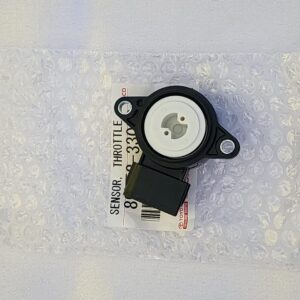Your car’s speedometer reading, anti-lock brake system, ignition timing, transmission system, and cruise control depend on signals from the speed sensor. So you need to ensure that it’s working as expected.
If you experience any of the following symptoms while driving, you might need to get the vehicle speed sensor inspected and replaced
Most cars depend on signals from the VSS and wheel speed sensor to adjust their speedometer readings. A faulty speed sensor (due to sensor tip contamination or wiring damage) can result in inconsistent or erratic speedometer readings.
Alternatively, it can result in no readings at all.
This doesn’t mean that your car would simply stop working and you can’t drive it anymore.
However, with a malfunctioning speedometer, you’ll have no clue about how fast your car’s going, which can compromise your road safety.
If you notice that the speedometer is acting odd, consider getting your car inspected by a mechanic to check for any VSS or wheel speed sensor failures.
If the check engine light on your car’s dashboard gets illuminated, it can be due to a variety of reasons, like:
However, it can also signal a defective speed sensor.
With a faulty speed sensor, an electronic control unit within your car might fail to detect a transmission speed sensor signal. And this error can activate your car’s engine light.
In such a situation, it’s best to take your car to a mechanic for an inspection.
Note: An illuminated ABS sensor or a traction control light can also indicate issues with the speed sensor.
In stock (can be backordered)
$18,425.11
Your car’s speedometer reading, anti-lock brake system, ignition timing, transmission system, and cruise control depend on signals from the speed sensor. So you need to ensure that it’s working as expected.
If you experience any of the following symptoms while driving, you might need to get the vehicle speed sensor inspected and replaced
Most cars depend on signals from the VSS and wheel speed sensor to adjust their speedometer readings. A faulty speed sensor (due to sensor tip contamination or wiring damage) can result in inconsistent or erratic speedometer readings.
Alternatively, it can result in no readings at all.
This doesn’t mean that your car would simply stop working and you can’t drive it anymore.
However, with a malfunctioning speedometer, you’ll have no clue about how fast your car’s going, which can compromise your road safety.
If you notice that the speedometer is acting odd, consider getting your car inspected by a mechanic to check for any VSS or wheel speed sensor failures.
If the check engine light on your car’s dashboard gets illuminated, it can be due to a variety of reasons, like:
However, it can also signal a defective speed sensor.
With a faulty speed sensor, an electronic control unit within your car might fail to detect a transmission speed sensor signal. And this error can activate your car’s engine light.
In such a situation, it’s best to take your car to a mechanic for an inspection.
Note: An illuminated ABS sensor or a traction control light can also indicate issues with the speed sensor.
| Warehouse | Inventory at warehouse 2 |
|---|

Get E-mail updates about our latest products and special offers.
Sensors and More is Jamaica’s ultimate online auto parts store. Established in 2020, we specialize in genuine electrical parts for Japanese, Read more…
Reviews
There are no reviews yet.